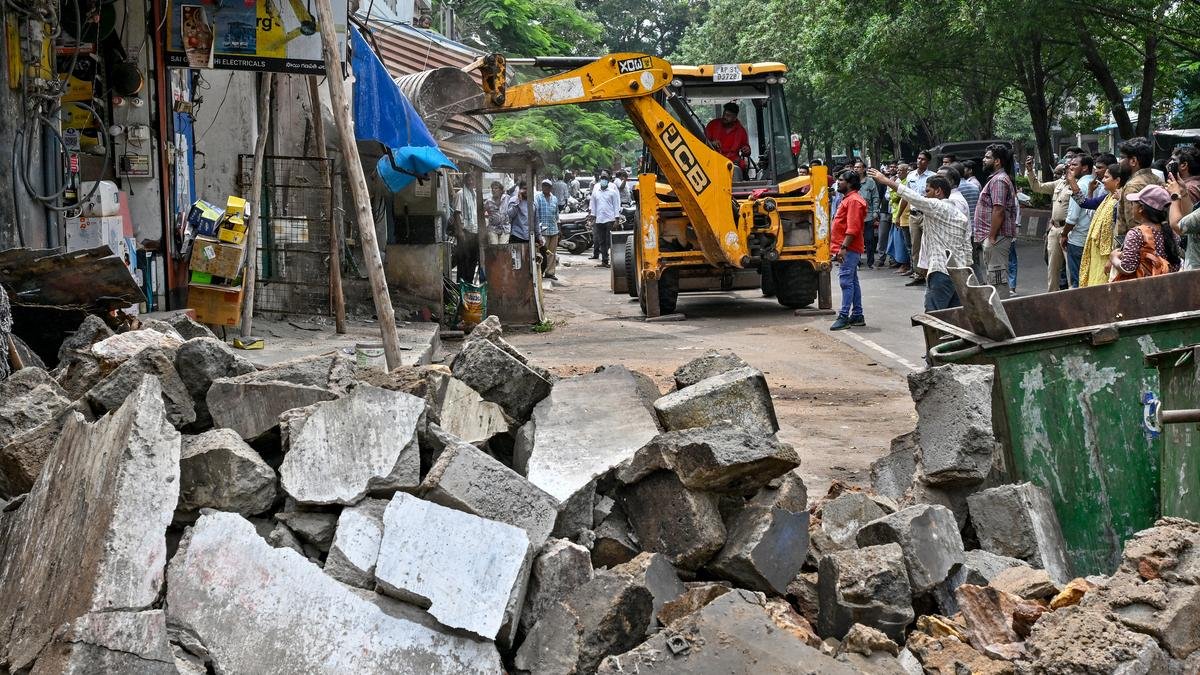The Greater Visakhapatnam Municipal Corporation (GVMC) recently launched a sweeping anti-encroachment drive under the banner “Operation Lungs”, aiming to reclaim public land, footpaths, roads, junctions, and green spaces in Visakhapatnam that are being used by vendors and other unauthorized structures. The Times of India+1 The move has stirred controversy, particularly over the eviction of vendors at the Jail Road night food court and other street stalls. The YSR Congress Party (YSRCP), in response, has denounced these evictions as “illegal” and submitted a memorandum to GVMC, demanding reconsideration.
Background: Scope of Operation Lungs
GVMC officials say that more than 1,750 encroachments across various city zones have already been cleared in recent days, targeting footpaths, roads, junctions, and public open spaces. The Times of India The municipal corporation justifies the campaign by citing citizen complaints about traffic snarls, blocked walkways, and misuse of public land. The Times of India+1
At the Jail Road night food court, GVMC officials moved to remove over 160 shops that they claim were operating illegally by encroaching on service roads. Around 60 vendors vacated voluntarily by evening, while the rest were being removed subsequently. The New Indian Express The municipality emphasizes that the removal is in line with resolutions passed by the GVMC Council dating back to 2023, including one on August 22, 2025. The Times of India+1
YSRCP’s Stand: Evictions Are “Illegal”
In reaction to the evictions, YSRCP has strongly objected. The party argues that the eviction of vendors—especially those operating from modest food stalls—was conducted without due procedure and violates the rights of vulnerable communities. In its memorandum to GVMC, YSRCP claims that the removal action lacked proper notice, consultation, and adherence to legal safeguards meant to protect vendors.
YSRCP leaders assert that many of the affected vendors belong to poor families who rely entirely on those stalls for their livelihood. They charge that the municipality acted unilaterally and insensitively, leaving these vendors with no fallback. They also demand that vendors be given lawful support—such as fixed monthly rents (instead of eviction), identity cards, and regulated allocations—so that their businesses can continue in a formal framework.
The party insists that the municipality must roll back the harshest evictions, pause further action until fair processes are adopted, and initiate dialogue with vendor associations.
On-Ground Impact: Vendor Protests & Hardship
Following the clearances, vendors at the food court and other sites protested the removals. Many appealed to GVMC for relief, lamenting the sudden loss of their only source of income. The New Indian Express A shawarma stall operator said: “This is our livelihood … many genuine vendors depend solely on these stalls.” The New Indian Express
GVMC, for its part, has indicated that vendors can apply for alternative sites or arrangements under applicable law (such as the Street Vending Act) and that their applications would be considered. The New Indian Express However, critics say the process is opaque and may not sufficiently mitigate the losses suffered by displaced vendors.
Adding to the criticism, a Human Rights Forum in Vizag has accused the municipality of acting unlawfully by evicting over 2,000 street vendors without undertaking surveys, issuing vending certificates, or consulting the Town Vending Committees—procedures mandated by the Street Vendors (Protection of Livelihoods and Regulation of Street Vending) Act, 2014. Deccan Herald Such actions, the forum argues, constitute a violation of the constitutional right to livelihood.
Legal and Policy Dimensions
The central legal issue revolves around whether the evictions comply with relevant statutes and procedural safeguards. Under the Street Vendors Act of 2014, municipalities are required to carry out surveys, grant vending certificates, and constitute Town Vending Committees to regulate street vending zones. Deccan Herald Critics allege the GVMC bypassed these steps, making the eviction orders vulnerable to challenge.
Moreover, YSRCP and vendor groups argue that fair notice, hearings, rehabilitation or relocation options, and alternate accommodation should have been integral before sweeping removal actions. The municipality contends that it acted in consonance with council resolutions and citizen complaints. The Times of India+1
What’s Next: Possible Outcomes & Stakes
- Political escalation: The confrontation gives YSRCP a strong point of attack against the ruling municipal administration in Visakhapatnam, potentially galvanizing public sympathy for affected vendors.
- Legal challenge: Vendors or civil society groups may approach courts alleging violation of procedural rights and the Street Vendors Act.
- Negotiated settlement: The GVMC could consider establishing designated vending zones, granting identity cards, and offering regulated rents to vendors, as demanded by YSRCP and stakeholder groups.
- Public reaction: Citizens who supported the clearance of encroachments for smoother traffic might support the drive; others concerned with livelihoods might side with vendors.







